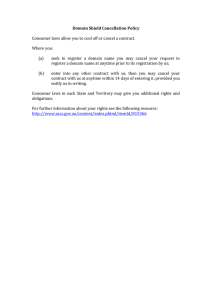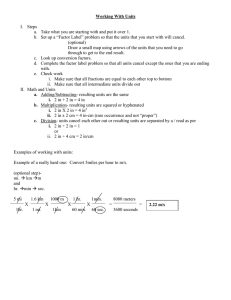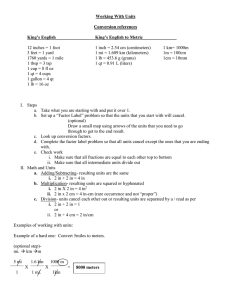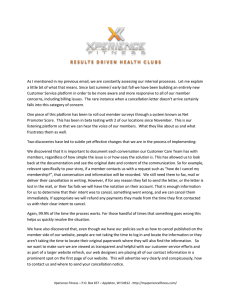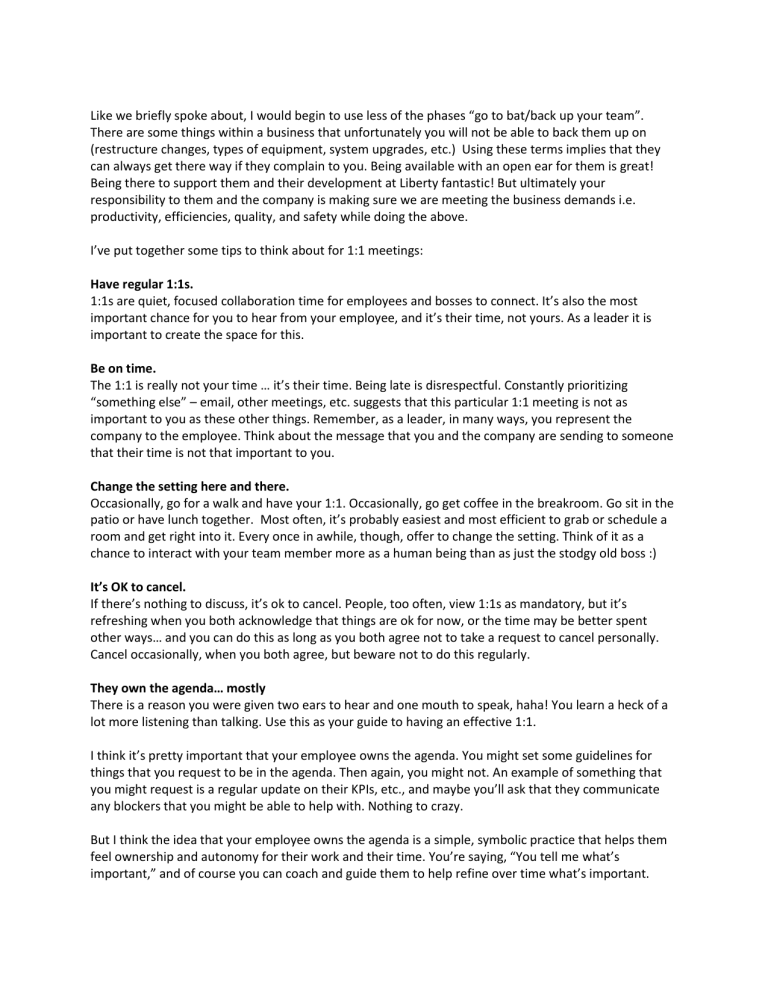
Like we briefly spoke about, I would begin to use less of the phases “go to bat/back up your team”. There are some things within a business that unfortunately you will not be able to back them up on (restructure changes, types of equipment, system upgrades, etc.) Using these terms implies that they can always get there way if they complain to you. Being available with an open ear for them is great! Being there to support them and their development at Liberty fantastic! But ultimately your responsibility to them and the company is making sure we are meeting the business demands i.e. productivity, efficiencies, quality, and safety while doing the above. I’ve put together some tips to think about for 1:1 meetings: Have regular 1:1s. 1:1s are quiet, focused collaboration time for employees and bosses to connect. It’s also the most important chance for you to hear from your employee, and it’s their time, not yours. As a leader it is important to create the space for this. Be on time. The 1:1 is really not your time … it’s their time. Being late is disrespectful. Constantly prioritizing “something else” – email, other meetings, etc. suggests that this particular 1:1 meeting is not as important to you as these other things. Remember, as a leader, in many ways, you represent the company to the employee. Think about the message that you and the company are sending to someone that their time is not that important to you. Change the setting here and there. Occasionally, go for a walk and have your 1:1. Occasionally, go get coffee in the breakroom. Go sit in the patio or have lunch together. Most often, it’s probably easiest and most efficient to grab or schedule a room and get right into it. Every once in awhile, though, offer to change the setting. Think of it as a chance to interact with your team member more as a human being than as just the stodgy old boss :) It’s OK to cancel. If there’s nothing to discuss, it’s ok to cancel. People, too often, view 1:1s as mandatory, but it’s refreshing when you both acknowledge that things are ok for now, or the time may be better spent other ways… and you can do this as long as you both agree not to take a request to cancel personally. Cancel occasionally, when you both agree, but beware not to do this regularly. They own the agenda… mostly There is a reason you were given two ears to hear and one mouth to speak, haha! You learn a heck of a lot more listening than talking. Use this as your guide to having an effective 1:1. I think it’s pretty important that your employee owns the agenda. You might set some guidelines for things that you request to be in the agenda. Then again, you might not. An example of something that you might request is a regular update on their KPIs, etc., and maybe you’ll ask that they communicate any blockers that you might be able to help with. Nothing to crazy. But I think the idea that your employee owns the agenda is a simple, symbolic practice that helps them feel ownership and autonomy for their work and their time. You’re saying, “You tell me what’s important,” and of course you can coach and guide them to help refine over time what’s important. Results While I don’t recommend using a 1:1 for simple work status updates, it is entirely appropriate to include “Progress toward goals” as a standing agenda item in a 1:1. In the spirit, though, of allowing the employee to own the agenda, give him or her the autonomy to tee up the discussion and prioritize the specific items to cover. That week might be all good news, or maybe that week there’s a blocker that he she needs help with. Perhaps the employee just wants some advice on a problem they are working through. Be there to support them in the achievement of their goals and enable them to determine how you do that. Career Development Allow space in the 1:1 to talk about and follow up on action items. Making this a habit like brushing and flossing will mean that you are investing in your folks in a differentiated way. Kevin Sheridan says in his LinkedIn post about the Top 3 Reasons Employees Quit, “[Managers] do not regularly meet with their direct reports to discuss Career Development, Learning, and Promotion Opportunities.” Regular investment in growth and development helps everyone – helps your employee grow towards their dreams, helps the team and company improve, and it helps your relationship with your employee. Feedback: Get It, Don’t Give it The 1:1 is not the place for the leader to give feedback to the employee. That’s not a typo, haha! Feedback to an employee should be a few minutes – given immediately after the specific situation or event. Instead think about the 1:1 as a chance to get feedback from your employees. If you want to build a culture of feedback, the best place to start is here. To get people to open up and prove you can take and that you value tough feedback: ask your go-to question, stay silent until your employee has the chance to answer, listen with the intent to understand not to cross-examine, and then reward the candor with a simple ‘thank you’ . You can also use a different method which can substitute or complement the above - Ask your employees to structure their 1:1 agendas by answering these questions: o What’s on your mind this week (or whatever time period you establish)? o How happy were you this past week? o How productive were you this past week? Rapport/Feedback for self What have your past leads done that you’d like me to also do or not do? Is there a situation you’d like my help with? What do you like about my leading style? What do you dislike? What could I do to make you enjoy your work more? What aspects of your work would you like more or less direction from me? What is something I could do better? What is a criticism you have for me? Progression What drives you? What motivates you to come to work each day? What work are you doing here that you feel is most in line with your long term goals? What area of the company would you like to learn more about? What skills would you like to develop right now? Are there any roles in the company you’d like to learn more about? What’s a recent situation you wish you handled differently? What would you change? What’s an area of your work you want to improve? What aspect of your job you would like more help or coaching? About our team How could we change our team meetings to be more effective? Do you feel everyone on the team is pulling their weight? If not how/why? Who is kicking ass on the team? What have they done? Who on the team do you have the most difficulty working with? Why? Do you help other members on the team? Do others help you when you need it? Do you feel we all work together as a team? Take action What can you do to take action or make progress on what we talked about today? What can I do to take action or make progress on what we talked about today? Open floor for the associate to feel heard Opportunity to get and burning issue you have off your chest.
